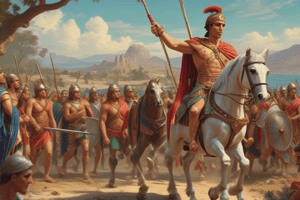Podcast
Questions and Answers
Hoe wordt Alexander de Grote genoemd in het Engels?
Hoe wordt Alexander de Grote genoemd in het Engels?
Alexander the Great
Wat is de betekenis van 'Gujastak' in de Perzische cultuur?
Wat is de betekenis van 'Gujastak' in de Perzische cultuur?
Accursed
Welke bijnaam werd aan Alexander gegeven in de Middel-Perzische bronnen?
Welke bijnaam werd aan Alexander gegeven in de Middel-Perzische bronnen?
Alexander de Verdoemde, Kwaadaardige Koning Alexander, Alexander de Romein
Welke mythische figuur in de Qur'an wordt geloofd gebaseerd te zijn op Alexander de Grote?
Welke mythische figuur in de Qur'an wordt geloofd gebaseerd te zijn op Alexander de Grote?
Wat was Alexander de Grote aan het zoeken toen hij de verre uithoeken van de wereld verkende in de Islamitische Perzische cultuur?
Wat was Alexander de Grote aan het zoeken toen hij de verre uithoeken van de wereld verkende in de Islamitische Perzische cultuur?
Hoe werd Alexander de Grote vereerd in middeleeuws Europa?
Hoe werd Alexander de Grote vereerd in middeleeuws Europa?
Welke bijnaam gebruikte de Delhi Sultanate heerser Alauddin Khalji voor zichzelf in relatie tot Alexander de Grote?
Welke bijnaam gebruikte de Delhi Sultanate heerser Alauddin Khalji voor zichzelf in relatie tot Alexander de Grote?
Hoe werd Alexander de Grote afgebeeld in Egypte?
Hoe werd Alexander de Grote afgebeeld in Egypte?
Welke gebeurtenis werd door Egyptenaren gezien als hun redding dankzij Alexander de Grote?
Welke gebeurtenis werd door Egyptenaren gezien als hun redding dankzij Alexander de Grote?
In moderne Griekse folklore, welke reactie van een zeemeermin op de vraag over Koning Alexander zou leiden tot haar verdwijning?
In moderne Griekse folklore, welke reactie van een zeemeermin op de vraag over Koning Alexander zou leiden tot haar verdwijning?
Flashcards are hidden until you start studying
Study Notes
Famous People and Their Nicknames: Alexander the Great
Alexander the Great, also known as Alexander III of Macedon, was a king of the ancient Greek kingdom of Macedon who succeeded his father Philip II and went on to conquer most of the known world. His accomplishments and legacy have been depicted in various cultures, including the Alexander Romance, which has had a significant impact on portrayals of Alexander in later cultures. In English, he is commonly known as "Alexander the Great," but in Middle Persian sources, he is referred to as "Alexander the Accursed," "Evil King Alexander," and "Alexander the Roman." In different cultures, he has been associated with various nicknames and titles.
Ancient Greek and Persian Cultures
In ancient Persian culture, Alexander is known as "Gujastak," which means "accursed," and he is accused of destroying temples and burning the sacred texts of Zoroastrianism. In Islamic Persia, a more positive portrayal of Alexander emerges, and he is included in the mythical line of legitimate Persian shahs, a heroic figure who explored the far reaches of the world in search of the Fountain of Youth. In the Qur'an, he is believed to be the basis for the figure of Dhu al-Qarnayn, who built a wall to defend against the nations of Gog and Magog and traveled the known world in search of the Water of Life and Immortality.
Medieval European Culture
In medieval Europe, Alexander the Great was revered as a member of the Nine Worthies, a group of heroes whose lives were believed to encapsulate all the ideal qualities of chivalry. During the first Italian campaign of the French Revolutionary Wars, Napoleon placed Alexander the Great in the first rank, stating that his campaign on Asia was the main reason for this preference.
Modern Greek and Other Cultures
In modern Greek folklore, Alexander is a household name, and he is the only ancient hero to appear in the Karagiozis shadow play. There is a fable among Greek seamen involving a solitary mermaid who grasps a ship's prow during a storm and asks if King Alexander is alive. The answer should be "He is alive and well and rules the world!" causing the mermaid to vanish, while any other answer would cause the mermaid to turn into a raging Gorgon who would drag the ship to the bottom of the sea.
In medieval India, the name "Sikandar" is derived from the Persian name for Alexander and denotes a rising young talent. The Delhi Sultanate ruler Alauddin Khalji stylized himself as "Sikandar-i-Sani" (the Second Alexander the Great).
In Egypt, Alexander was portrayed as the son of Nectanebo II, the last pharaoh before the Persian conquest. His defeat of Darius was depicted as Egypt's salvation, "proving" Egypt was still ruled by an Egyptian.
In medieval Europe, Alexander the Great was revered as a member of the Nine Worthies; a group of heroes whose lives were believed to encapsulate all the ideal qualities of chivalry. During the first Italian campaign of the French Revolutionary Wars, in a question from Bourrienne, asking whether he gave his preference to Alexander or Caesar, Napoleon said that he places Alexander The Great in the first rank.
Impact on Modern Culture
Alexander's nicknames and titles have shaped his image in various cultures throughout history, and his accomplishments continue to inspire and influence modern society. From his early depictions in Middle Persian and Islamic Persian literature, to his portrayal in modern Greek folklore, and his influence on medieval Indian culture, Alexander's legacy remains an important part of global history.
Studying That Suits You
Use AI to generate personalized quizzes and flashcards to suit your learning preferences.




